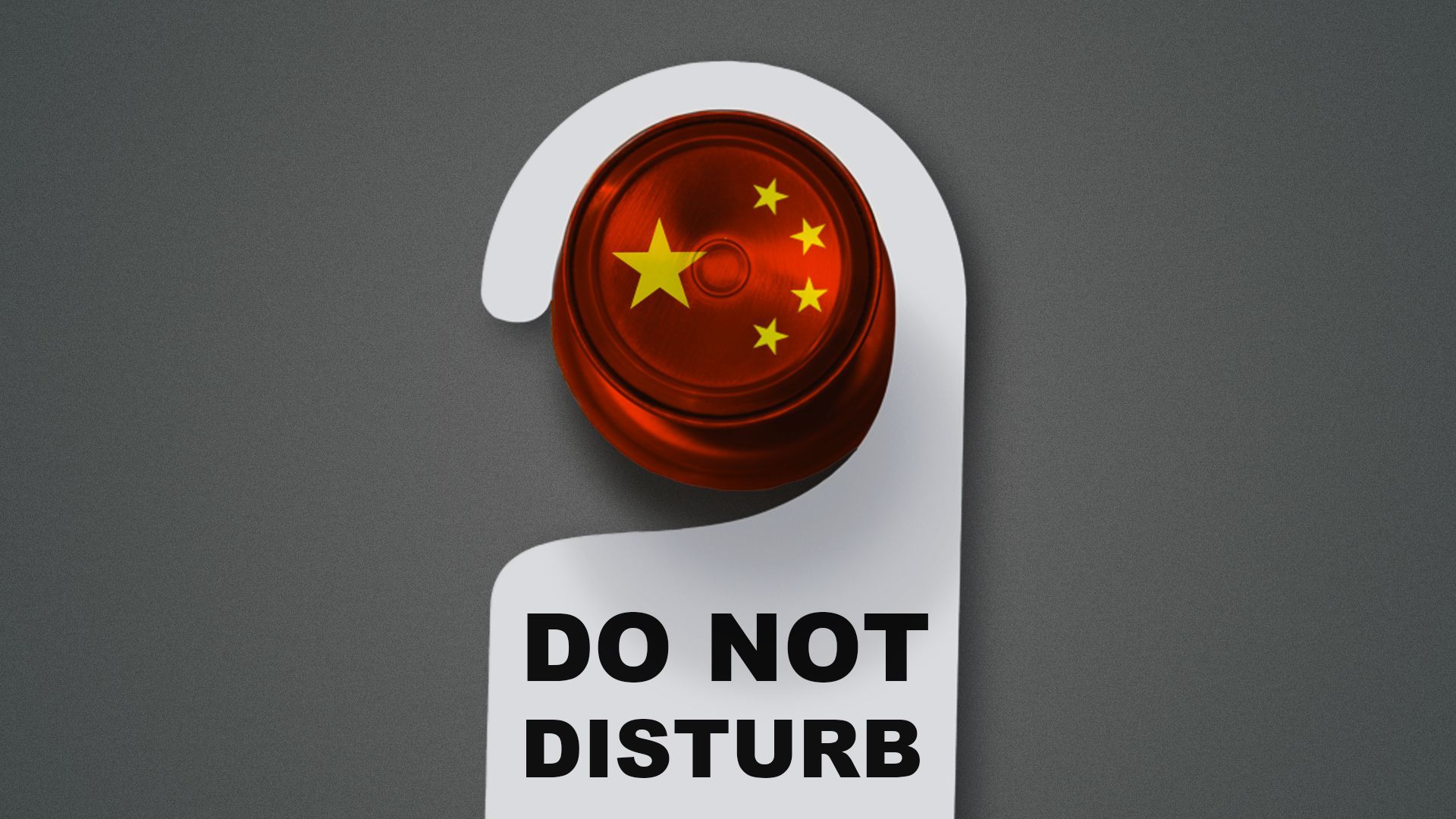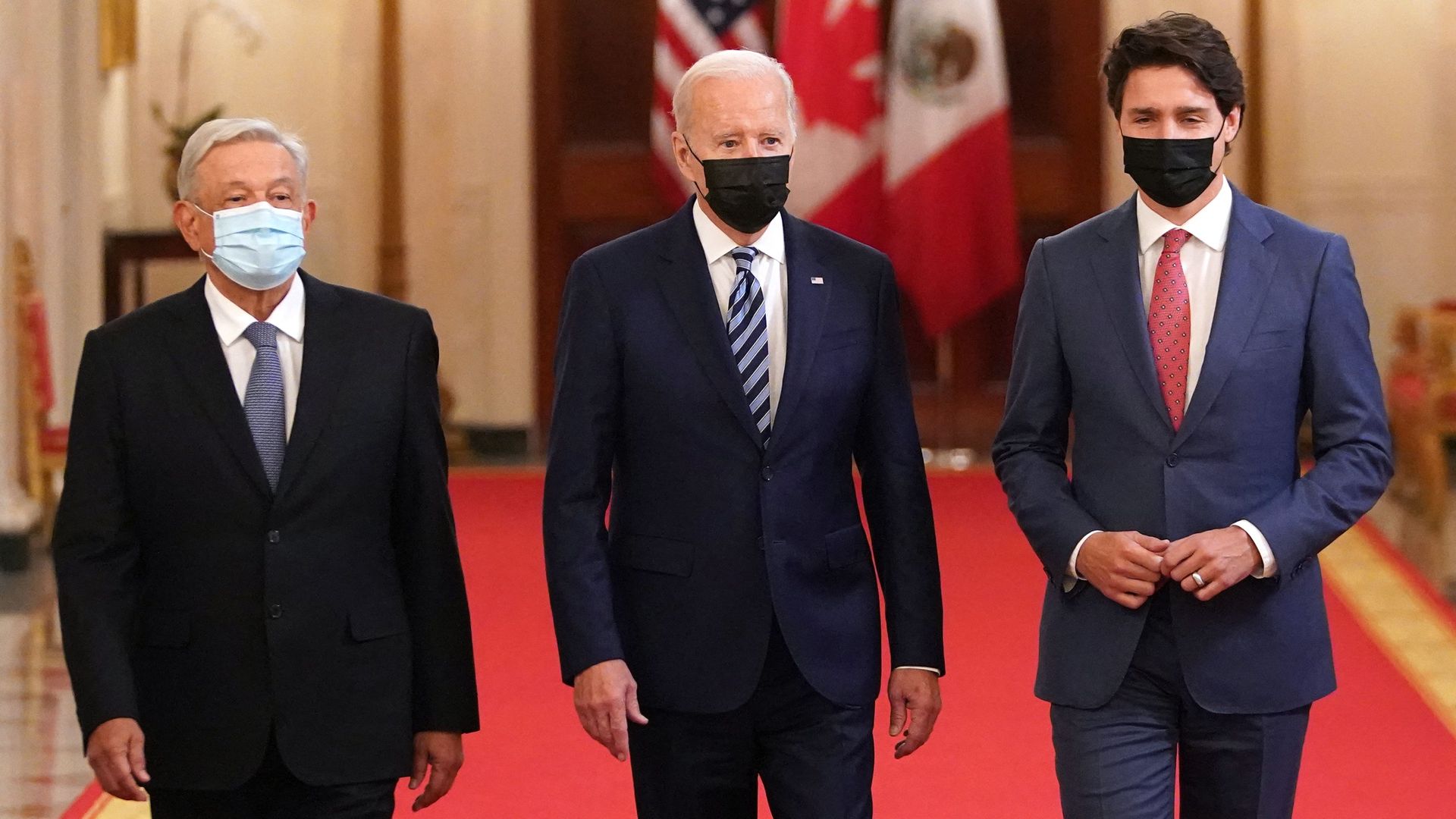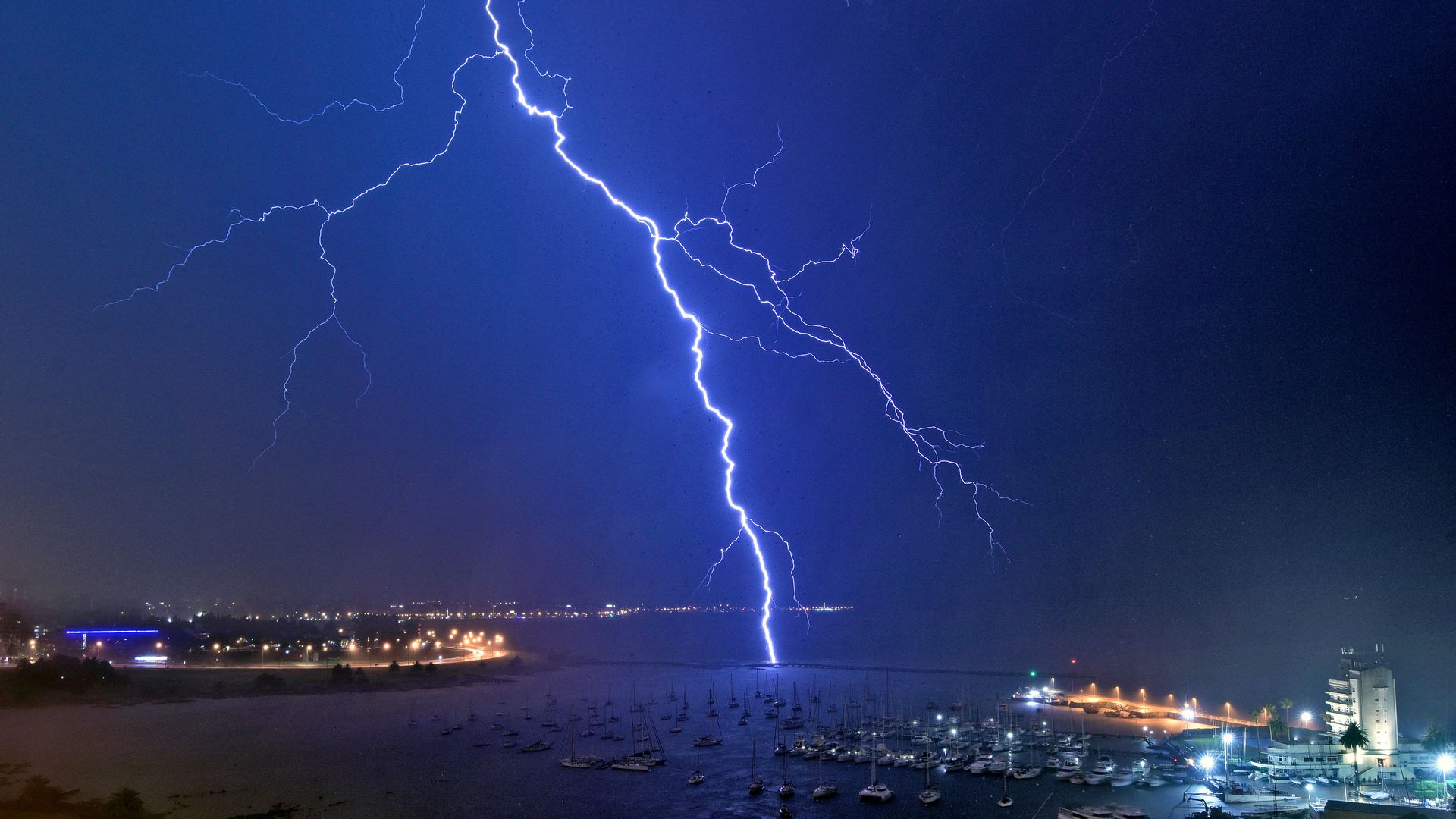| | | | | | | Presented By MethaneSAT | | | | Axios World | | By Dave Lawler ·Nov 18, 2021 | | Welcome back to Axios World. - We've got a packed edition for you tonight (1,796 words, 6½ minutes), starting with a scoop on Marriott and China, looking at India's free pass from Biden, and sitting down for dinner with Alexei Navalny's top team.
- Please spread the word about Axios World and subscribe here.
| | | | | | 1 big thing: Marriott refused to host Uyghur conference |  | | | Illustration: Shoshana Gordon/Axios | | | | The Marriott hotel in Prague declined to host a conference of activists and leaders from China's Uyghur diaspora this month, citing "political neutrality," an email shared with me and my colleague Bethany Allen-Ebrahimian shows. Why it matters: The Chinese government has condemned the World Uyghur Congress, which has attempted to rally global attention to the genocide in Xinjiang, China. The decision to reject the conference reflects China's growing ability to extend authoritarian control beyond its borders by making clear to corporations that crossing the party's red lines will be bad for business. - The World Uyghur Congress consists mainly of Uyghurs living in exile and advocates for the rights of those who remain in the Xinjiang region in western China, where upward of 1 million people have been held in internment camps.
- About 200 delegates from 25 countries gathered in Prague Nov. 12–14 to elect the organization's new leadership and hold discussions with politicians, academics and civil society representatives from around the world. The Prague Marriott Hotel declined to host the conference.
- Melissa Froehlich Flood, Marriott's senior vice president for global corporate communications, told Axios the hotel would be "contacting the group to apologize, as the hotel's response was not consistent with our policies."
How it happened: Working with local partners in Prague, organizers for the conference reached out to several hotels for quotes, Zumretay Arkin, the Munich-based program and advocacy manager for the World Uyghur Congress, tells Axios. The group then sent a representative to visit the Marriott. - "At first, the person didn't mention the background information on the conference and the organization that was organizing it," Arkin says. That information came up during the visit.
- Not long thereafter, an email arrived from an events manager at the hotel:
"Thank you very much for your visit today. Unfortunately, I have to inform you that we are not able to offer the premises. We consulted the whole matter with our corporate management. For reasons of political neutrality, we cannot offer events of this type with a political theme. Thank you once again for your time and understanding." — Oct. 1 email Between the lines: Marriott frequently hosts political fundraisers and events. - Flood clarified in a statement to Axios that hosting the conference would not have violated any "political neutrality" policy and said the reference to "corporate management" in the email referred to "hotel-level management."
The U.S.-based company does have a history of flare-ups involving China, its biggest international market. - Marriott International issued a profuse apology in 2018 after Chinese authorities shut down its booking website over an online questionnaire that listed Tibet, Taiwan, Hong Kong and Macao as countries, rather than regions of China.
- Also in 2018, Marriott fired a U.S.-based employee who used a company Twitter account to like a post by a pro-Tibet group.
The big picture: The World Uyghur Congress has repeatedly drawn the ire of Chinese authorities, who have declared it a terrorist group for allegedly fomenting unrest in Xinjiang, though the group does not promote violence and is on no international terrorist lists. - Ahead of the conference, the Chinese Embassy in Prague condemned the Congress and the politicians who participated.
- Prague Mayor Zdeněk Hřib, who attended the conference, said in response: "I hear that China is unhappy about this conference being held here in Prague. Well, I am unhappy there's a country in 2021 that has concentration camps."
|     | | | | | | 2. India's free pass |  | | | President Biden meets with India Prime Minister Narendra Modi in September. Photo: Sarahbeth Maney-Pool/Getty Images | | | | For the second consecutive year, the State Department bypassed a recommendation from an independent government commission to name India to its "red list" of countries engaged in "systematic, ongoing, and egregious" violations of religious freedom, Axios' Zach Basu reports. Why it matters: Strengthening ties with India has featured prominently in both the Trump and Biden administrations' strategies for countering China, which New Delhi now regards as its biggest security threat. - Former President Trump had no qualms about embracing Prime Minister Narendra Modi, a Hindu nationalist who was once banned from entering the U.S. over "severe violations of religious freedom" during his time as governor of the state of Gujarat.
- But for President Biden, who has pledged to place human rights at the "center" of his foreign policy, the issue is far more delicate.
- Still, Biden has pressed ahead by hosting Modi at the White House and forging new ties through the Quad, a strategic dialogue between the U.S., India, Japan and Australia that Beijing views as hostile. Biden also reportedly plans to invite India to his Summit for Democracy next month.
Between the lines: "I do not believe for a second that the United States has a foreign policy centered on human rights, no matter what Biden or anyone says," Ashley Tellis, a senior fellow at the Carnegie Endowment for International Peace, told Axios. - "Foreign policies are anchored in very sensible notions of interests, and human rights are one interest among many. They have never been and will never be at the center of U.S. foreign policy or U.S. strategic policy."
What's next: The next test of Modi's free pass will be whether India is sanctioned for acquiring Russia's S-400 air defense system, which is required under the Countering America's Adversaries Through Sanctions Act. Turkey was sanctioned for a similar purchase. |     | | | | | | 3. Team Navalny fights on |  | | | Leonid Volkov (right) with Alexei (center) and Yulia Navalny in 2016. Photo: Mikhail Svetlov/Getty Images | | | | With their leader jailed, their organization declared an "extremist" enterprise and their staff forced into exile, the leaders of Alexei Navalny's Anti-Corruption Foundation are intent on keeping up the pressure on Vladimir Putin, and on keeping Navalny alive. What they're saying: "We have a slogan that Putin has to regret that he pushed us out of the country," says Leonid Volkov, Navalny's top adviser. - Exile is both painful and liberating. Now operating out of Vilnius, Lithuania, Volkov says he's no longer in and out of prison and no longer has to worry that any equipment the foundation purchases will be confiscated by Russian authorities.
- "It's a matter of principle" to show that they are "just as strong without Navalny next to us" and wouldn't stop even if he were to be killed, says Maria Pevchikh, head of the foundation's investigative unit, which produced the "Putin's Palace" investigation that generated 120 million views on YouTube. There's more where that came from, she says.
- Plus, with additional time on his hands, Navalny is coming up with too many "brilliant" ideas for new projects for his team to even keep up with, Volkov quips. They communicate through his lawyers.
Setting the scene: Volkov and Pevchikh spoke to a small group of reporters over dinner on Wednesday night at an Italian restaurant in Washington. - They were in town for meetings with the administration and on Capitol Hill, to push Congress to finalize sanctions Navalny proposed on 35 key Putin associates, and for Volkov to testify at a congressional hearing Thursday on kleptocracy.
- They also want to keep Navalny's name in the political and media discourse to increase the pressure on Putin to release him, or at least decrease the odds of another assassination attempt.
Flashback: Navalny was arrested in August after returning to Russia from Germany, where he was recuperating from Novichok poisoning. - Both Volkov and Pevchikh say they were certain he would return. But did they know he'd be arrested?
- "We didn't know and we were sure at the same time," Pevchikh says. Volkov notes that he and Navalny spent four days in Germany game-planning how the organization would function if Navalny were jailed.
- Pevchikh became the subject of wild conspiracy theories from the Kremlin propaganda machine after Navalny's poisoning, including that she had staged the whole thing on behalf of the U.K.'s MI6 spy agency. Now their former colleagues who remain in Russia face the threat of retrospective arrests.
The bottom line: "Everyone understands that his sentence is a life sentence," Volkov says. "The question is whose life." |     | | | | | | A message from MethaneSAT | | We need to cut methane fast. Our first-of-its-kind satellite can help | | |  | | | | The U.S. joined over 100 countries in a pledge to slow global warming by cutting methane emissions 30% by 2030. MethaneSAT, a methane tracking satellite scheduled to launch in 2022, will help countries and companies meet this pledge to address the climate crisis. Learn more at MethaneSAT.org. | | | | | | Bonus: Where in the world |  | | | Screengrab via Apple Maps | | | | We're making another nighttime trip, this time to Europe. You've got a pretty good shot at identifying the two cities marked with pins. But what about the numbers farther East? Scroll to the bottom for the answer. |     | | | | | | 4. Global news roundup |  | | | President Biden played host to the first North American leaders summit of his presidency today. (L-R) López Obrador, Biden and Trudeau. Photo: Mandel Ngan/AFP via Getty | | | | 1. An statement nominally from tennis star Peng Shuai, released by Chinese state media, has only deepened the concern and confusion around her disappearance from the public eye in the two weeks since she accused a senior Chinese official of sexual assault. - Steve Simon, the head of women's professional tennis, has said he has a "hard time believing" Peng actually wrote the statement retracting her claim.
2. The Belarusian government on Thursday cleared the camps at the border of Poland where hundreds of Middle Eastern migrants were attempting to enter Europe, signaling a potential off-ramp to the manufactured crisis. 3. National security adviser Jake Sullivan raised with his Israeli counterpart the idea of an interim agreement with Iran to buy more time for nuclear negotiations, Axios' Barak Ravid scoops. |     | | | | | | 5. Data du jour: Killing coal won't be easy |  Data: BP; Chart: Danielle Alberti/Axios Let's leave to history to see whether the COP26 deal to "phase down" coal instead of "phase out" makes any real-world difference. What's clear, however, is that any meaningful "phasing" at all is hard, Axios' Ben Geman writes. Go deeper. |     | | | | | | 6. What I'm reading: Should we want the Taliban to succeed? |  | | | A Taliban fighter guards a shipment of humanitarian aid. Photo: Valery Sharifulin\TASS via Getty | | | | Yaroslav Trofimov asks a provocative question in a recent WSJ long read: Should the U.S. want the Taliban to succeed? Breaking it down: Starting from the reality that the militants are firmly entrenched in power, U.S. policymakers have a few broad options: - Undercut and oppose the Taliban so the group doesn't grow in clout and legitimacy and inspire similar movements elsewhere, as some GOP hawks suggest.
- Maintain leverage over the Taliban with carrots and sticks in an attempt to shape the group's behavior — including toward terror groups like al-Qaeda — as seems to be the Biden administration's general approach.
- Actively cooperate with the Taliban on issues of mutual concern — such as helping to pay the salaries of schoolteachers, medical workers and potentially civil servants — and lift sanctions and asset freezes.
This is not a thought exercise. - The imminent threat of starvation looms over half the population, per the World Food Program. A cash crunch, due in part to U.S. asset freezes, has left the economy barely functional.
- In responding to the almost unfathomable scale of the humanitarian crisis, the Biden administration will have to weigh the extent to which it is willing to help a Taliban government function.
Yes, but: A senior European official put it this way to Trofimov: "There is so much history here, with the wounds, the humiliation. … You cannot expect the West to act totally coldhearted and rational." |     | | | | | | 7. Stories we're watching |  | | | Lightning strikes in Montevideo, Uruguay. Photo: Mariana Suarez/AFP via Getty | | | - South China Sea standoff
- German regulator pauses certification of Nord Stream 2
- Congress fights over its own war power
- Biden-Xi meeting: What we learned; What's next; One deliverable.
- Rubio blocks Biden's nominee for ambassador to China
- The growing global reach of Mexican food
- Olympics sponsors caught between U.S. and China
Quoted: "Something we're considering." — Biden today on a diplomatic boycott of the Beijing Olympics |     | | | | | | A message from MethaneSAT | | We need to cut methane fast. Our first-of-its-kind satellite can help | | |  | | | | The U.S. joined over 100 countries in a pledge to slow global warming by cutting methane emissions 30% by 2030. MethaneSAT, a methane tracking satellite scheduled to launch in 2022, will help countries and companies meet this pledge to address the climate crisis. Learn more at MethaneSAT.org. | | | | Answers: Madrid (red pin), Paris (purple pin), St. Petersburg (1), Stockholm (2), Warsaw (3) and Kyiv (4). |  | | It'll help you deliver employee communications more effectively. | | | | | | Axios thanks our partners for supporting our newsletters. If you're interested in advertising, learn more here.
Sponsorship has no influence on editorial content. Axios, 3100 Clarendon Blvd, Suite 1300, Arlington VA 22201 | | | You received this email because you signed up for newsletters from Axios.
Change your preferences or unsubscribe here. | | | Was this email forwarded to you?
Sign up now to get Axios in your inbox. | | | | Follow Axios on social media:    | | | | | |












No comments:
Post a Comment